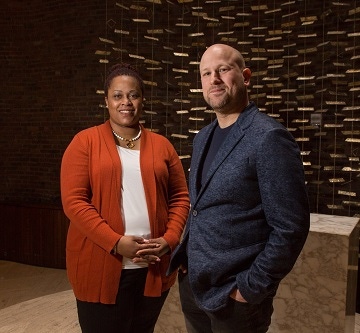The Computer Age fueled the ever-accelerating pace of innovation, but as the Digital Age matures, there are plenty of discussions about tech ethics, especially in light of AI. Emerging tech leaders are more likely to include ethics as an integral part of innovation, according to MIT's first humanist chaplain, Greg Epstein. Here's why.

The tech industry's approach to innovation will likely undergo a major shift as new generations of tech leaders come to power. Historically, innovation has been economically motivated for the benefit of individuals and shareholders, which will continue to be true, although the nature of innovation will likely evolve to consider its impacts on the world in greater depth than has been true historically.
"As an innovator, you may be able to make some term gain without having to worry or be concerned about ethics whatsoever," said Greg Epstein, the newly-appointed first humanist chaplain at the Massachusetts Institute of Technology (MIT) and executive director of The Humanist Hub. "You may be able to achieve some things that we define as success in this world without caring about or even paying any attention to ethics, but in the long term, [that approach] will likely have some directly damaging consequences in your life. What I'm seeing students prepare for today is not just conventional success but to have an inner life that is meaningful."
Values change from generation to generation, so it should be no surprise that what fueled the tech industry's direction to date may change in the future. While it's true that some of today's tech leaders demonstrate a capacity for doing something good for society, the general trajectory is to innovate, grow, exit, maybe repeat the last three steps a few times and then focus on something like underprivileged individuals.
Doing something "good" later in life is consistent with mid-life realizations of mortality when one questions the legacy one is leaving behind. According to Epstein, the Millennials and Generation Z are more likely to ponder the societal value of their contributions earlier in their career than Baby Boomers or Generation X.
Tech Innovation for Good Versus Tech Innovation Is Good
Arguably, technology innovation has always focused on the positive, if "the positive" is defined as achieving the art of the possible. For example, cars are safer and more reliable than they once were, as the result of technology innovation.
However, the more technologically dependent people and things become, the more vulnerable they are to attacks. In other words, the negative potential consequences of new technology tend to be an afterthought, with the exception of products and services that are designed to protect people from negative consequences, such as cybersecurity products.
In previous generations, technology impacted society more slowly than it does today, so the mainstream positive and negative effects tended to take longer to realize. For example, adoption of the first mobile phones was relatively slow because they were large and heavy, and cellular service was spotty at best. Now, entire industries are being disrupted seemingly overnight by companies such as Uber and Airbnb.
Generational Differences Matter
Each generation is shaped, in part, by the world in which they mature. Over the past several decades, each subsequent generation has been exposed to not only more technology, but more sophisticated technology. The "new normal" is a connected world of devices, many of which are recording everything, and social media networks through which anything and everything can be shared.
"Increasingly, young people on campus want to create collaborative technology [so] that people can have a fair opportunity in life and human beings can help one another to achieve a better of life than we've ever had before," said Epstein. "I think that people are hungry for conversations about what that could look like [and] what that could mean because human beings have never had this responsibility before to transform our collective lives for the better."
Innovation for a Higher Purpose
Thus far, technology innovators have followed a pattern, which is to innovate, to capitalize, and to then deal with negative consequences later if and when they arise. In other words, the tech industry has been focused on the art of the possible, generally without regard for the entire spectrum of outcomes that results.
"There are structures in our world, in our technology, in our industry that set the world up to be to the advantage of some and to the disadvantage of some. People are going to rise up in the 21st century and demand a more ethical set of business practices," said Epstein. "Young people today are not going to accept the kind of unjust technology and unjust innovation that we've had too much of in the past."
Historically, technology and business leadership in the U.S. have been dominated by Caucasian males, although globalization is changing that, rapidly. Globalization has also impacted the minds of younger generations because they’ve had greater exposure to other cultures than most of their predecessors had, and from a younger age.
"It would be almost laughable to try to ignore conversations about what is socially just and what isn't in this generation," said Epstein. "I think that comes from the fact that we're raising these young people to have meaningful relationships with people from very different parts of the world with very different experiences and backgrounds."
Paradoxical Evolution
Generations are also shaped by the available media of the day, which has been true of radio, television, the Internet, and social media. Each generation uses the tools for their own purposes, which in the case of social media, has been to advance change, either through fake news (ala Cambridge Analytica and Facebook) or crisis-inspired activism.
"When I look at the response to the Parkland shooting and the incredible young leaders that started the March for Our Lives, they're not watching TV passively the way I was when I was their age," said Epstein. "They're having a dialogue with one another on Snapchat, they're perfecting their platforms, they're perfecting their sense of what is right and good and they're actually getting educated about how to fight for it."
Epstein sees his role as helping students channel their energy for good, including providing support during times when it might be easy to sacrifice what is good for society for what is profitable for a few.
"I think you'll start to see companies make short-term sacrifices in profit and in marketing and messaging that will, in many cases, have long-term benefits," said Epstein. "You'll start to see companies that may be more comfortable serving a specific market in a socially sustainable way and not growing, you know, in a wildfire way as we might have hoped and expected. People are trying to work out for themselves what it looks like to have a successful life in in a more just and ethical economy."
However, weighing ethics against profits may be a challenging task since capitalism now, at least in the U.S., tends to be focused on short-term gains including quarterly profits and faster return on venture capital investment.
Tech Ethics is Everyone's Choice
Tech ethics isn't just the domain and responsibility of inventors and tech innovators, it's everyone's responsibility. Unless society places a high value on ethics, and demands it, the old model of innovation for innovation's sake will persist without regard for its consequences, both positive and negative.
While the dire AI warnings from Elon Musk, Bill Gates, and Stephen Hawking may be disregarded by some as alarmism, the reality is that the pace of technology innovation is continuing to accelerate and in the race to disrupt or otherwise change the status quo, little thought is given to the ultimate outcomes, at least yet.
"There's something fundamental to our humanity that we are at risk of giving up," said Epstein. "As chaplain, I think [I have to take] a middle position to ethical challenges without saying innovation as a whole is bad, so let's get rid of it and live around a campfire."
Technology innovation isn't going to stop, nor should it, but there are very real questions about societal impacts which really have to do with use cases. For example, image sensors protect homes and people while simultaneously eroding personal privacy.
"Too many tragedies have happened because people just couldn't imagine changing direction," said Epstein. "There's no one right way, but if we have the humility to say that we will make mistakes, we have to be sensitive to those mistakes and have a constant dialogue about those mistakes so at the very moment it becomes clear we've made a terrible mistake ethically or technologically that we will reverse course."
Not everyone will make the same choices, however. Cars and drones can be programmed to kill, so if death is not an acceptable consequence, what will people do about it?
Disruption is happening faster than ever, and it's continuing to accelerate, so the question becomes whether there's even time to integrate ethics into innovation processes. The answer is "yes," and like all things in the digital world, earlier in the lifecycle will likely prove to be cheaper and more effective, but before that occurs, a fundamental mindset shift needs to happen, which the younger generations may affect.
About the Author(s)
You May Also Like







